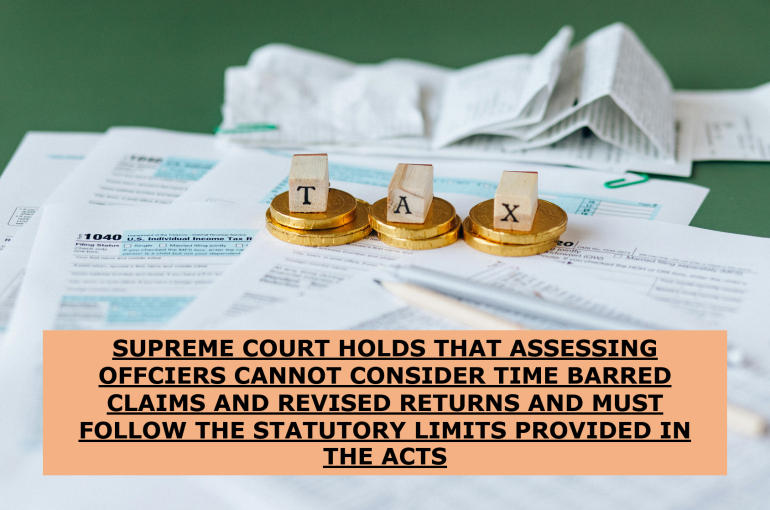SUPREME COURT HOLDS THAT ASSESSING OFFICERS CANNOT CONSIDER TIME BARRED CLAIMS AND REVISED RETURNS AND MUST FOLLOW THE STATUTORY LIMITS PROVIDED IN THE ACTS
A two Judge Bench of the Hon’ble Supreme Court comprising of Justice Abhay S Oka and Justice Augustine George Masih passed a judgement dated 04.10.2024 in the case of M/s. Shriram Investments v. The Commissioner of Income Tax III Chennai Civil Appeal No. 6274 of 2013 wherein the Bench held that Assessing Officers cannot entertain the claims which are time barred in nature.
Facts
The Appellant, M/s. Shriram Investments, initially filed an Income Tax Return for the assessment year 1989-90 on 19.11.1989 under the Income Tax Act 1961 (IT Act). The Appellant revised this return on 31.10.1990, and paid the necessary tax as per intimation on 27.08.1991.
Another revised return was filed on 29.10.1991, but the Assessing Officer refused to acknowledge it due to being time-barred under Section 139(5) of the Income Tax Act (IT Act) (Return of income). Specifically, the Section permits the filing of a corrected return in the event that the initial return contains an error or omission. Nevertheless, this can only be carried out one year from the conclusion of the pertinent assessment year or prior to the assessment’s completion, whichever comes first.
The Appellant appealed to the Commissioner of Income Tax (CIT) but the said Appeal was dismissed on the ground that the revised return was filed beyond the time limit.
The Appellant then appealed to the Income Tax Appellate Tribunal (Tribunal), and the Income Tax Tribunal allowed the Appeal and remanded the case to the Assessing Officer for reconsideration.
The Income Tax Department challenged this decision of the Tribunal in the Madras High Court having Appeal no. TA-344-2005, wherein the Madras High Court held that the revised return, being barred by time, could not be entertained, and thus the Appellant’s claim could not be considered and thus setting aside the decision of the Tribunal vide Order dated 16.06.2011.
Hence, the Appellant filed the Appeal in the Supreme Court against the Madras High Court Order dated 16.06.2011
The Counsel for M/s. Shriram Investments argued that the Tribunal’s decision was correct, as it allowed the Assessing Officer to examine the claim for deferred revenue expenditure in line with the law. The Counsel referred to the judgement of Wipro Finance Ltd. v. Commissioner of Income Tax 2022 (137) taxmann.com 230 (SC) to support the view that claims omitted in the original return can still be made during assessment proceedings.
The Additional Solicitor General (ASG) on behalf of the Commissioner of Income Tax relied on rulings in Goetze (India) Ltd. v. Commissioner of Income Tax (2006) 157 Taxman 1 (SC) and Principal Commissioner of Income Tax v. Wipro Limited (2022) 446 ITR 1 to argue that once the time for filing a revised return has passed, no claims made after that point can be considered. The Hon’ble High Court’s decision, which upheld this principle, was correct in holding that the Assessing Officer had no jurisdiction to entertain a time-barred revised return.
Issues
- Whether the Tribunal erred in passing the Order to send back the case to the assessing officer to re-examine the claim?
- Whether the claim presented by the Appellant was time barred?
Decision of the Supreme Court
The Supreme Court carefully reviewed relevant case laws, including the Appellant’s reliance on Wipro Finance Ltd. judgement (supra), but found it inapplicable to the current case. That decision focused on the appellate powers of the Tribunal, not on the Assessing Officer’s jurisdiction after a revised return is time-barred.
In Goetze (India) Ltd. judgement (supra), it was clearly established that the assessing officer cannot entertain claims made outside the statutory provisions of the IT Act. Since the revised return filed by the Appellant was late, it could not be entertained.
The Hon’ble Court also examined the provisions and reiterated that a revised return under Section 139(5) of the IT Act cannot be used to transform or introduce new claims once the statutory time limit has expired.
Conclusion
The Hon’ble Supreme Court held that the Income Tax Appellate Tribunal had overstepped its jurisdiction by remanding the case to the Assessing Officer to consider a claim based on a time-barred revised return.
The High Court’s judgment was affirmed, and the Appellant’s Civil Appeal bearing no. 6274/2013 was dismissed.
Thus, the Judgment reinforces the principle that claims for deductions or other revisions in tax returns must be filed within the statutory limits, and no further claims can be entertained by the assessing officer after the time limit has lapsed.
ARJAV JAIN
ASSOCIATE
THE INDIAN LAWYER & ALLIED SERVICES





































Leave a Reply